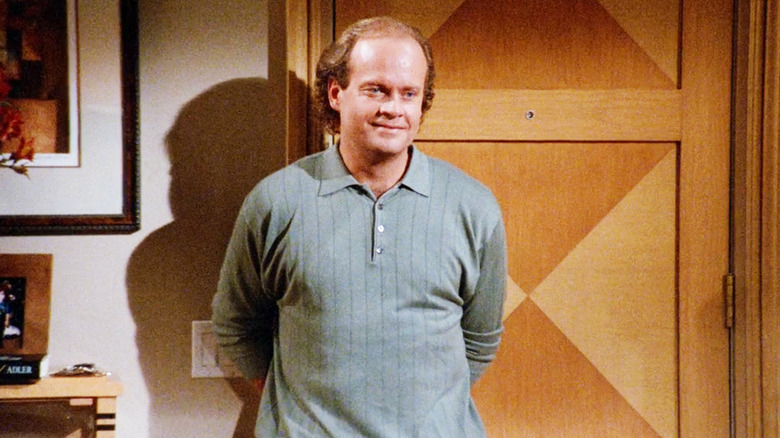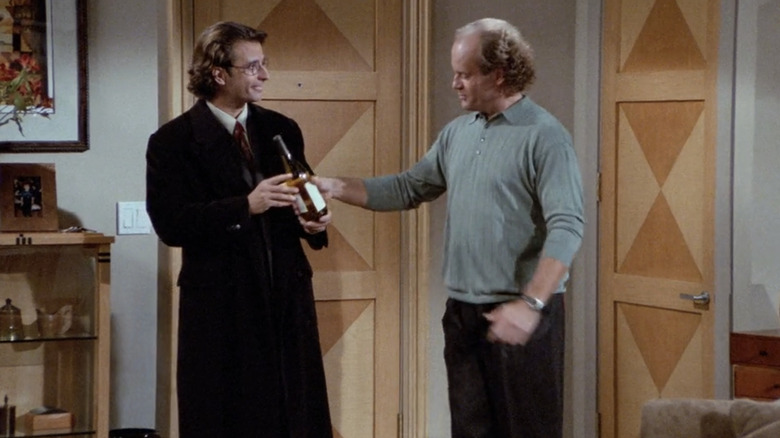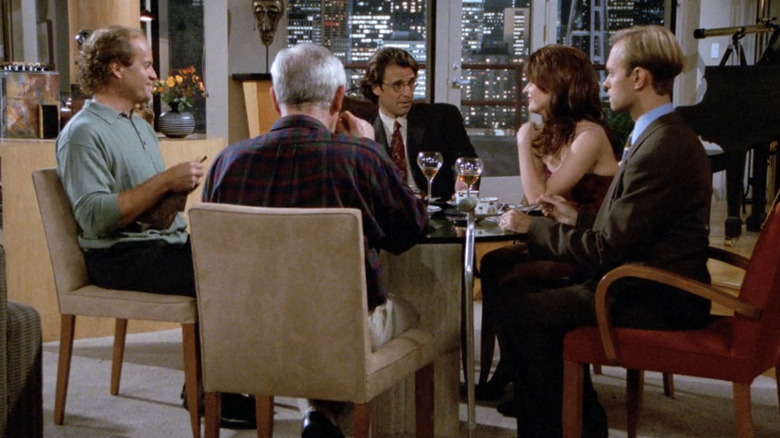Frasier's Foray Into Farce Really Began Thanks To Season 2's The Matchmaker
Farce has played a significant role in the history of "Frasier," despite the sitcom being renowned for its more sophisticated comedy. Somehow, putting Kelsey Grammer's pompous yet lovable Dr. Crane at the center of some ridiculous hijinks served only to highlight how absurd a figure he could be rather than undermining the otherwise highbrow humor of the series. Farce proved a worthy technique for knocking both Frasier and often his brother, Niles (David Hyde Pierce) off their high horses in particularly hilarious fashion.
It's not surprising, then, that farcical episodes are among the series best, from the famous Ski Lodge episode in season five to the dead seal episode, which was inspired by real events. But it took some time for the series to develop its unique spin on the genre. During the inaugural season of the show, which aired all the way back in 1993, the writers didn't attempt a single farce. It wasn't until writer Joe Keenan arrived and introduced his comedic sensibility that "Frasier" really embraced the format.
"The Matchmaker" aired during the second season of "Frasier" in 1994 and saw the titular doctor unwittingly go on a date with his male station manager. Keenan's tightly written farce proved the show could support such comedy without collapsing beneath the weight of the absurdity of it all. As such, "The Matchmaker" set a precedent that "Frasier" would follow for years after.
Frasier's first farce
"Frasier" always took chances with comedy and "The Matchmaker" is an excellent early example. As Joe Keenan told Advocate in 2006, prior to his episode being produced, the show hadn't really ventured into farce territory and it wasn't something you'd necessarily expect a show like "Frasier" to try. The writer explained:
"I certainly did push the show towards exploring comical, farcical gay themes. I think more than anything, my contribution to that show was to import farce storytelling into it, because they hadn't done a farce the first season."
In the episode, Frasier invites Tom Duran (Eric Lutes), the new manager of the KACL radio station, to his home for dinner. But the doctor has an ulterior motive for the invite, as he's aiming to fix up Tom with his father's live-in aid Daphne (Jane Leeves). But as it turns out, Tom is gay and sees the whole thing as a date between him and the good doctor. Things obviously unravel as the episode goes on, with Niles finding out what's going on and delighting in the confusion, eventually telling Frasier the truth, leading to an awkward exchange between the doctor and his boss.
After "The Matchmaker" debuted in '94, almost every season of "Frasier" had some sort of farce episode included, with Kenan telling the Advocate, "It became part of the repertoire of the show that they would on occasion play with farce." Not only that, but these episodes are actually considered some of the best in the series' run, from "The Two Mrs. Cranes" in season four to "Out With Dad" in season seven.
The Matchmaker continued Frasier's tradition of taking risks
"The Matchmaker" was the first episode Joe Keenan wrote that was actually produced. It was an auspicious debut for the writer, who won a Writers Guild award for episodic TV comedy for his debut episode and went on to become a regular writer before stepping into the executive producer role by the time "Frasier" ended in 2004. Meanwhile, director David Lee won an Emmy and a Directors Guild award for outstanding directing for a comedy series for "The Matchmaker." On top of that, the episode won a 1995 GLAAD Media Award for Best Comedy Episode — all of which is a testament to the fact that "farcical gay themes," as Keenan put it, seemed to not only work within the context of "Frasier," but actually elevated the show.
As the writer told Advocate, Frasier and Niles "were metrosexuals a good five or six years before the term was coined." In that sense, the potential for campy genre plays to flourish within the context of the show was always there, even if it seemed as if a sitcom about a fuddy-duddy psychiatrist with hifalutin taste didn't necessarily lend itself to absurd, outlandish plots and unlikely scenarios. The fact that the show could support such hijinks, while simultaneously maintaining its ability to deliver profound, heartfelt moments speaks to the brilliance of a series that seemed to thrive on taking chances. Frasier getting his own sitcom wasn't even the plan to begin with, so in many ways, the series started by deviating from the script. Thanks to writers like Keenan, that spirit of exploration and risk-taking continued throughout 11 seasons.


